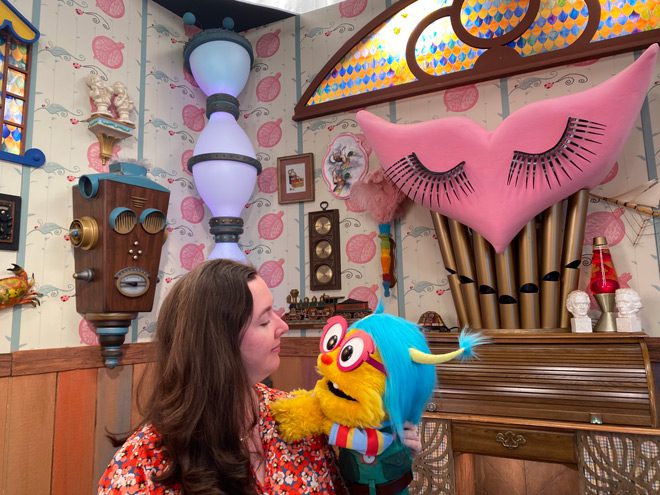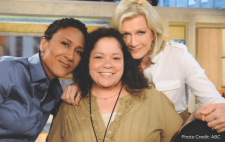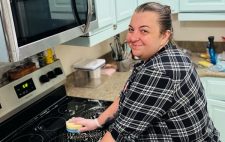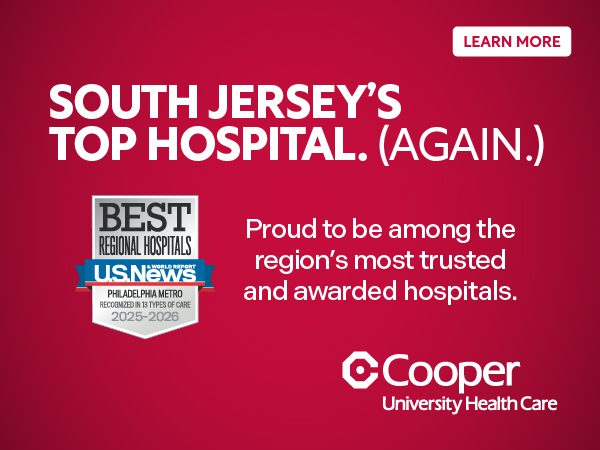Like millions of others, Caitlin Corkery grew up watching PBS kids shows like “Arthur” and “Mister Rogers’ Neighborhood.” They helped shape her future, and today the Collingswood resident calls her role as a producer at WHYY a “dream job.” So when the station received a $1.85 million grant from the William Penn Foundation in 2022 to produce new content, Corkery used it to create “Albie’s Elevator,” WHYY’s first-ever locally produced original children’s show, and “The Infinite Art Hunt,” a show aimed at older kids.
In some ways, Albie’s Elevator is classic PBS. Its protagonist is a Jim Henson-style puppet and the set is a colorful, eclectically decorated elevator that also houses a robot intercom and a talking pipe organ named Loretta. There are silly songs and lessons in sharing, caring and creativity. But it’s also a show for today’s kids. Albie often grapples with complicated feelings, helped along by a huge cast of artists and musicians, and there’s an accompanying online curriculum. The show’s second season premiered this summer, with a pop-up opening in Collingswood to mark its start. Corkery talked with us about the future for Albie – and public broadcasting.
Q: Who is Albie?
Albie is a self-appointed elevator operator in her building. I would say she’s about 7ish in human years. Albie’s an enthusiast – her highs are high, her lows are low. She gets really excited about stuff and wants to dive right in. Sometimes she can be a little too much for her friends, but we learn how to navigate and kind of make sure that everyone’s playing in a way that works for them. She’s just a very excitable, lovable elevator operator.
Q: How were you inspired to create the show?
My older daughter was born in June of 2020, so she hadn’t been outside our house a ton. I loved the idea that showcased real people in the real world, where kids could be inspired by all the cool things you can do in real life.
Q: Is Albie’s character partially based on your daughter, or on yourself?
I think so many people see themselves in Albie. It’s so interesting to create a character that you’re like, well, this is me. And then other people also can see themselves reflected. I’m definitely an enthusiast. I’m a person who gets really excited about stuff and then struggles when other people aren’t as excited. That’s definitely something that’s reflected in Albie.
This is kind of funny – the person who designed Albie knew my daughter at the time. Albie has these two cute little vampire teeth up front, and the designer gave her those because they’re the only two teeth my daughter had at the time.
Q: Where did ideas for the episodes come from?
A lot of the themes that come across in Albie’s episodes are pulled directly from the experiences of my daughter or her peers. I also often go into the Facebook mom groups and ask, “What are your kids going through? What do you need resources around?”
When you’re making a show like this and you are a parent, you can say, “Ok, well, what do I want to see for my kids?” So it’s universal enough that other kids can relate to it.
Q: It’s great that all the artists and musicians and other creatives Albie meets are from South Jersey and Philly.
Every aspect of the show is made locally. Our puppet was made locally. All of our crew is local. Our talent is local. The artists and the musicians we feature are all local. That’s something we’re really proud of.
Q: Can you tell us about your other show, “The Infinite Art Hunt”?
It’s really an arts field trip. We wanted to take kids behind the scenes of places they know or into spaces that they might not otherwise get to visit. We wanted kids to watch it and then feel confident and comfortable entering art spaces and really seeing themselves as people who can interact with art.
There’s 15 episodes, and in every episode we go to a different space. My particular favorite is the Philadelphia airport because they have incredible art installations that are very thoughtfully curated. That’s a great example of somewhere a kid could be experiencing art in an everyday space.
Q: Why did you open a pop-up in Collingswood, where people could experience a real-life version of Albie’s Elevator?
That was part of our season 2 promotion. It feels like such a great marketing spend to do community engagement. We got to see kids and talk to our audience. It was the best two weeks being able to actually be with kids in Albie’s space.
Public media is different than our commercial counterparts. We’re never going to be able to play on the same field because, quite frankly, we just don’t have the budget they do. So rather than trying to be competitive, we can think instead about the things that make public media unique and lean into those. For me, it’s the local aspect. It’s the fact that we’re actually in your community, that we have these great engagement tools.
Q: Why do you think educational shows like these are so important?
TV can be such a powerful tool for kids and families. As a parent, there’s so much content out there, but it’s not all created equally. Some content is there to keep your kid locked into the screen as long as possible to get ad revenue. Some is made to sell things. Public media has this incredible opportunity to just be educational. PBS is considered America’s preschool. It has content that is so rigorously vetted by educational consultants to make sure it’s developmentally appropriate. So, when you’re swimming in this sea of endless choices for kids, it is such a lifeline for parents and guardians to know this is content that is curated and safe, and something that a kid is going to learn from. It’s going to make them more curious. It’s going to make them more engaged. I could talk about public media forever. I think it is massively important.
Q: Public broadcasting recently lost a significant amount of government funding. How are you feeling?
Just speaking for me and my team, the mission remains the same. We feel really confident that our community will rise to this moment and continue to support us, or maybe support us in ways they haven’t before. We just feel even more motivated to do what we know is useful for kids and families. We all have a renewed sense of purpose.
A silver lining of this moment we’re in is hearing from so many people about the ways that public media has shaped their lives. The entry point is always the kids’ stuff. The first thing you remember about public media is these reliable, familiar faces through the programs that you loved as a kid. So 30 years from now, hopefully there is some kid in a bar asking their friends, “Do you remember Albie’s Elevator?” and it becomes part of the fabric of their childhood.

















